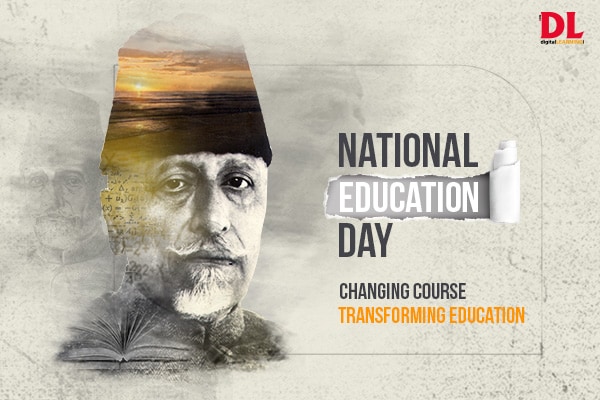
When was the last time you realised education isn’t just about grades, it’s about changing lives? Ever wondered what people in 1947 imagined when they built the first schools of a free India?
Those questions take us to why we celebrate National Education Day every November 11. It’s not just another date on the calendar. It’s a reminder of a promise, one made by Maulana Abul Kalam Azad, India’s first Education Minister, who believed that true freedom could exist only when every citizen could think, question, and learn.
Back then, the dream was simple but massive: build schools, print books, open minds. Education was a revolution of its own, a fight against ignorance and inequality.
Fast forward to 2025, and everything around us has changed. Classrooms are no longer confined to walls. AI tutors explain complex equations, virtual labs recreate experiments, and students in remote villages can learn from teachers across the globe. Education has become faster, smarter, and more connected than Azad could have ever imagined.
But here’s the twist: the same technology that empowers us can also divide us. AI in education is powerful but is it accessible to all? Does it include every child, every background, every dream? Or are we building a system where only the connected can keep up?
That’s what National Education Day is really about today, not just celebrating progress, but questioning it. Azad’s vision wasn’t about producing workers; it was about creating thinkers, citizens, and changemakers. And as AI reshapes learning, we need to remember that education’s true goal isn’t just efficiency — it’s humanity.
This Year’s Theme: AI and Education – Preserving Human Agency in a World of Automation
The 2025 theme brings that truth into sharp focus. It reminds us that while AI can make learning smarter, it should never make it smaller. Machines can teach facts, but they can’t teach values. They can process data, but not dreams. Preserving human agency means ensuring that every learner still has the power to think freely, question deeply, and choose their own path without being defined by an algorithm.
Voices That Inspire
Siddharth Rajgarhia, Co-Founder, Equanimity Learning; Chief Learner and Director, Delhi Public School – Varanasi, Nashik, Lava Nagpur & Hinjawadi Pune
“On this National Education Day, we honour the visionaries who laid the foundation of modern India through education. Today, as we prepare our students for a rapidly evolving world, it is imperative that we embrace Artificial Intelligence as a core part of school learning. AI is not just a tool, it is a new language of thinking, creating, and solving. Integrating it thoughtfully into our classrooms will empower Gen-Z and GenAlpha to become ethical innovators and compassionate leaders. The future belongs to those who can blend values with technology. Let our schools be the crucibles where this future is forged – with courage, curiosity, and care.”
Geeta Jayanth, Head of School, Chaman Bhartiya School
“We honor Maulana Abul Kalam Azad’s enduring conviction that education must awaken the mind and liberate the spirit. I am strongly of the opinion that learning moves beyond instruction, it inspires transformation. The future belongs to those who think deeply, act ethically, and lead with empathy. Classrooms must not be confined by walls but defined by possibilities, where curiosity fuels innovation and reflection shapes purpose. Education must cultivate agency, not compliance; collaboration, not competition. At Chaman Bhartiya School, we harness technology and experiential learning to create leaders of tomorrow and innovators who combine intellect with integrity. True education does not prepare students merely for the world; it empowers them to reimagine and improve it.”
Satish NarahariMurthy, Founder and CEO, Roombr Technologies
“The rapid evolution of AI is redefining the future of education. Schools and institutions worldwide are shifting from standardized instruction to personalized learning, where AI adapts lessons, assessments and pacing to the needs of every student. AI-powered automation is significantly reducing teacher workload—from grading and content creation to administrative coordination—allowing educators to focus on mentoring and deeper engagement. Real-time insights now help identify learning gaps early, improving student outcomes and classroom efficiency. AI also enables collaboration, communication, and project-based learning, equipping students with the skills needed for a digital-first world. The next phase of education is clear: human-led, AI-augmented learning environments that are more interactive, inclusive, and impactful.”
Shri Naresh Jadeja, Executive Registrar, Marwadi University
“Schools are entering a new era of technology with the help of AI, data analysis, and immersive learning tools. In honor of Maulana Abul Kalam Azad’s vision, we celebrate National Education Day. Also, think about how technology is changing jobs and schools in India. The 2024 Global Education Monitoring Report from UNESCO says that almost 47% of colleges and universities around the world now use AI to help them teach and test. Over 70% of Indian teachers now use a digital platform to teach. NASSCOM says that the EdTech market will be worth more than $10 billion by 2026, growing at a rate of 28% every year. The World Economic Forum says that AI-powered adaptive systems are making learning more personal than ever and helping people remember what they learned by up to 30%. Science and engineering are coming to life thanks to virtual and augmented reality. It is expected that AR/VR education will cost more than $20 billion around the world by 2030. This means that teachers are no longer just teachers; they are also digital advisers. But as we move forward, we need to think about things like data privacy, using AI responsibly, and the digital divide, which affects 25% of children in rural areas. The future of education will be shaped by schools that combine human sensitivity with technological skill to make learning more fair, effective, and open to everyone.”
Also Read: Delhi Government launches ‘School Web App’ to digitally transform education ecosystem
Professor Aindril De, Chief Academic Officer, Univo Education
 “For education to truly empower, access and outcomes must progress together. As NEP 2020 targets a 50% GER by 2035, India cannot rely solely on traditional models; flexibility has to be a right, not a privilege. Online degree programs make quality higher education available anywhere, grounded in UGC-recognized curricula, taught by university faculty, delivered mobile-first, AI-enabled, vernacular-supported, and connected to industry through applied projects, portfolios, micro-credentials, and internships. They enable uninterrupted careers, reduce cost burdens, expand participation, and convert learning into employability. India’s next leap will be powered by digital public infrastructure, interoperable credentials, and scalable online learning-and UNIVO is committed to enabling this next frontier with purposeful university-industry collaboration.”
“For education to truly empower, access and outcomes must progress together. As NEP 2020 targets a 50% GER by 2035, India cannot rely solely on traditional models; flexibility has to be a right, not a privilege. Online degree programs make quality higher education available anywhere, grounded in UGC-recognized curricula, taught by university faculty, delivered mobile-first, AI-enabled, vernacular-supported, and connected to industry through applied projects, portfolios, micro-credentials, and internships. They enable uninterrupted careers, reduce cost burdens, expand participation, and convert learning into employability. India’s next leap will be powered by digital public infrastructure, interoperable credentials, and scalable online learning-and UNIVO is committed to enabling this next frontier with purposeful university-industry collaboration.”
Bhuwaneshwari B, Executive Vice President, Tally Education Pvt Ltd (TEPL)
“On this National Education Day, we focus on turning lessons into live-world opportunities. Our mission is to build confidence, teach practical business skills and guide young learners toward careers where they can grow and make a difference. By partnering with educational institutes, government skilling initiatives, corporate CSR and training centers across rural and urban India, we bring hands-on learning in areas industry values most- managing accounts, understanding finance and operating daily business functions. As AI and digital tools become integral to every workplace, we ensure our learners not only use technology, but use it thoughtfully, purposefully and as a bridge into lasting careers. Education is the key that connects potential with impact. On this day, we pledge to keep that key meaningful for every learner.”
Let’s Keep the Conversation Going…
So, as we celebrate National Education Day this year, let’s pause for a moment, not to look back with nostalgia, but to look forward with purpose. We’ve come a long way from chalkboards to chatbots. But the real win will be when every learner, everywhere, gets a future that’s powered by AI, yet guided by humanity.



























